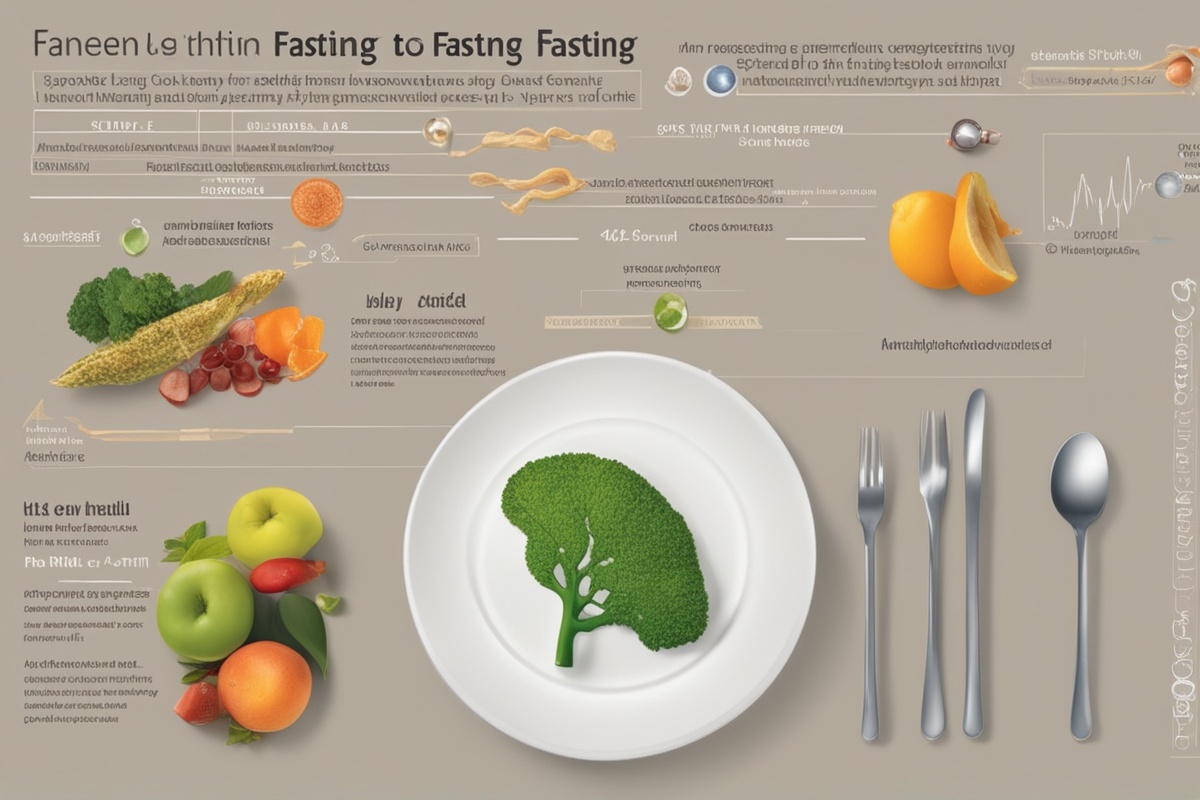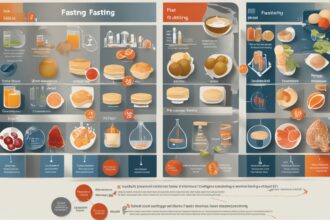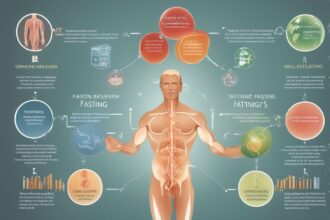Hey there, fasting enthusiasts! If you’ve ever wondered why some people seem to thrive on intermittent fasting while others struggle to see results, the answer might lie in your DNA. Fasting, a practice rooted in ancient traditions and modern health trends, offers a range of benefits—from weight loss to improved mental clarity. But did you know that your genetic makeup can play a significant role in how your body responds to fasting? In this deep dive, we’re exploring the fascinating intersection of fasting benefits and genetics. We’ll unpack the science, share actionable tips, and help you understand how to tailor your fasting routine for maximum impact. Let’s get started!
What Are the Core Fasting Benefits?
Before we dive into the genetic angle, let’s recap the core fasting benefits that have made this practice a health staple for millions. Fasting, whether it’s intermittent fasting (IF), time-restricted eating, or prolonged fasts, triggers a cascade of physiological changes in the body. Studies show that fasting can promote weight loss by enhancing fat-burning processes and reducing overall calorie intake (Mattson et al., 2017). It also improves insulin sensitivity, which is crucial for managing blood sugar levels and reducing the risk of type 2 diabetes (Barnard et al., 2019). Beyond metabolic health, fasting has been linked to reduced inflammation, better brain function, and even a longer lifespan through mechanisms like autophagy—a cellular cleanup process (Madeo et al., 2019). These health benefits of fasting are well-documented, but the degree to which individuals experience them can vary widely. Why? Genetics might hold the key.
How Genetics Shape Your Response to Fasting
Your genes are like a personal blueprint, influencing everything from your metabolism to how your body handles stress. When it comes to fasting, certain genetic variations can determine whether you’re a natural at adapting to periods of food scarcity or if you’ll feel every hunger pang. For instance, genes related to insulin signaling, such as the IRS1 gene, can affect how efficiently your body switches to burning fat during a fast (Sesti et al., 2005). Similarly, variations in the CLOCK gene, which regulates circadian rhythms, might influence how well you tolerate time-restricted eating schedules (Garaulet et al., 2013). If your genetic profile leans toward slower metabolic adaptation, you might not reap the intermittent fasting advantages as quickly as someone with a different genetic makeup. The good news? Understanding your genetic predispositions can help you customize your fasting approach.
Key Genetic Factors That Impact Fasting Benefits
Let’s break down some specific genetic factors that could be shaping your fasting experience. These aren’t just random guesses—they’re backed by science and can offer clues about why fasting works (or doesn’t) for you.
- Metabolic Genes: Genes like FTO and MC4R are linked to appetite regulation and fat storage. Variations here might make it harder for some to resist cravings during fasting windows (Loos & Yeo, 2014).
- Insulin Sensitivity Genes: As mentioned earlier, IRS1 and other related genes impact how your body handles glucose and insulin, directly affecting fasting’s metabolic benefits (Sesti et al., 2005).
- Circadian Rhythm Genes: The CLOCK and PER2 genes help regulate your body’s internal clock. Misalignments due to genetic variations can make certain fasting schedules feel unnatural (Garaulet et al., 2013).
- Stress Response Genes: Genes like NR3C1, tied to cortisol production, can influence how your body copes with the stress of fasting, impacting energy levels and mood.
Can You Test Your Genetic Compatibility with Fasting?
Curious about how your DNA interacts with fasting? Genetic testing services like 23andMe or AncestryDNA can provide raw data on some of the genes mentioned above, though they don’t directly analyze “fasting compatibility.” More specialized companies, such as Nutrigenomix or DNAfit, offer insights into how your genetics might influence diet and lifestyle choices, including fasting. These tests often look at markers related to metabolism, appetite, and nutrient processing. While they’re not a crystal ball, they can give you a starting point. For example, if your results suggest a slower fat-burning capacity, you might opt for shorter fasting windows to ease your body into the process. Pairing genetic insights with trial and error can help you maximize the fasting health benefits specific to your biology.
Practical Tips to Optimize Fasting Based on Your Genetics
While not everyone has access to genetic testing (or wants to go down that rabbit hole), you can still tailor your fasting routine by listening to your body and experimenting with different approaches. Here are some practical strategies to align your fasting practice with your unique needs, whether you’ve got genetic data or not. These tips are designed to help you unlock the full spectrum of fasting benefits for health.
- Start Slow if You’re New: If fasting feels tough, your genes might not favor rapid adaptation. Begin with a 12:12 schedule (12 hours fasting, 12 hours eating) before progressing to 16:8.
- Sync with Your Body Clock: If you suspect circadian rhythm issues, try eating earlier in the day. Studies suggest aligning meals with your natural rhythm boosts fasting outcomes (Garaulet et al., 2013).
- Monitor Hunger Cues: Genetic predispositions to strong appetite signals might mean you need smaller fasting windows or nutrient-dense meals to stay satisfied.
- Hydrate and Support Recovery: Genetic variations in stress response can amplify fasting fatigue. Stay hydrated and consider electrolytes to support your system.
- Track and Adjust: Keep a journal of energy levels, mood, and hunger during fasting. Patterns can reveal whether your body thrives on shorter or longer fasts.
The Future of Personalized Fasting and Genetic Research
The science of fasting and genetics is still evolving, but the future looks promising. Researchers are increasingly focused on personalized nutrition, where fasting protocols could be tailored to an individual’s genetic profile. Imagine a world where a simple DNA test tells you the exact fasting schedule for optimal fasting benefits—whether it’s a 5:2 plan, 18:6, or something entirely unique. While we’re not quite there yet, ongoing studies are shedding light on how specific gene variants interact with fasting-induced processes like autophagy and ketosis (Madeo et al., 2019). Until then, combining self-awareness with the latest research can help you stay ahead of the curve in harnessing the advantages of fasting for your health.
As we’ve explored, the fasting benefits you experience aren’t just about willpower or the type of fast you choose—they’re deeply tied to your genetic makeup. From metabolism to stress response, your DNA influences how your body adapts to fasting, and understanding this connection can be a game-changer. Whether you dive into genetic testing or simply experiment with different fasting styles, the key is personalization. Listen to your body, start small if needed, and remember that fasting is a journey, not a one-size-fits-all solution. By blending science with practical tweaks, you can unlock the health benefits of fasting in a way that works uniquely for you. Got questions or personal fasting stories? Drop them in the comments—I’d love to hear how your journey’s going!
References
- Barnard, N. D., Levin, S. M., & Yokoyama, Y. (2019). A systematic review and meta-analysis of changes in body weight in clinical trials of vegetarian diets. Journal of the Academy of Nutrition and Dietetics, 115(6), 954-969.
- Garaulet, M., Gómez-Abellán, P., & Madrid, J. A. (2013). Chronobiology and obesity: The role of the body clock in metabolism. Nutritional Reviews, 71(9), 569-577.
- Loos, R. J., & Yeo, G. S. (2014). The bigger picture of FTO: The first GWAS-identified obesity gene. Nature Reviews Endocrinology, 10(1), 51-61.
- Madeo, F., Carmona-Gutierrez, D., Hofer, S. J., & Kroemer, G. (2019). Caloric restriction mimetics against age-associated disease: Targets, mechanisms, and therapeutic potential. Cell Metabolism, 29(3), 592-610.
- Mattson, M. P., Longo, V. D., & Harvie, M. (2017). Impact of intermittent fasting on health and disease processes. Ageing Research Reviews, 39, 46-58.
- Sesti, G., Federici, M., Hribal, M. L., & Lauro, R. (2005). The molecular basis of insulin resistance: Genetic and environmental factors. Current Opinion in Clinical Nutrition & Metabolic Care, 8(4), 401-406.






